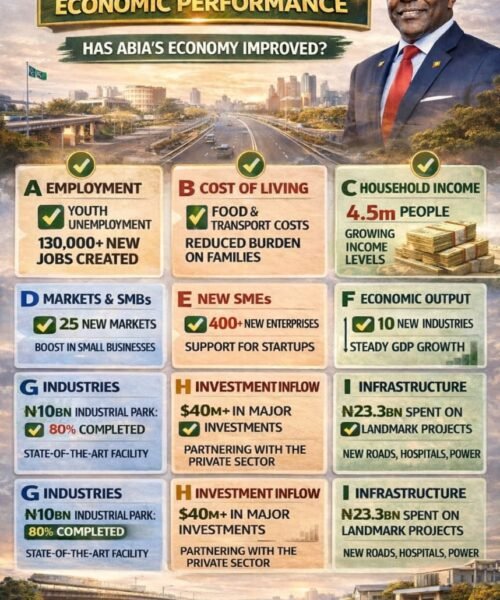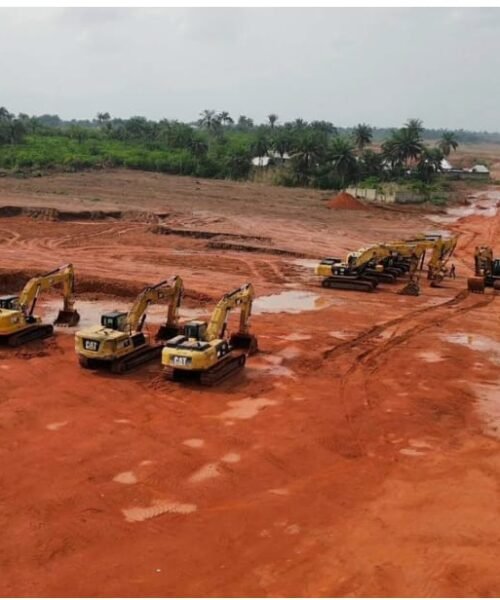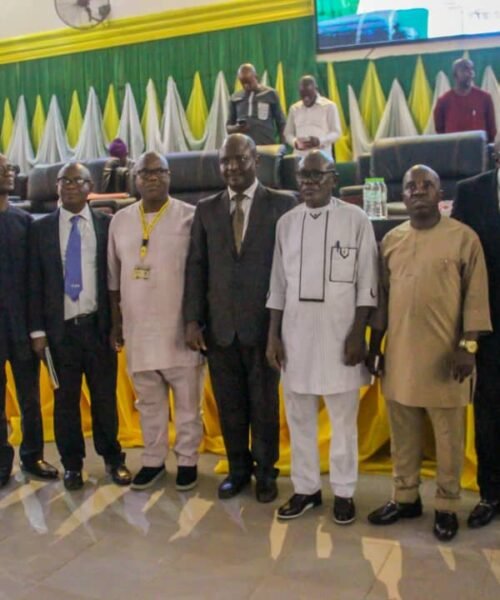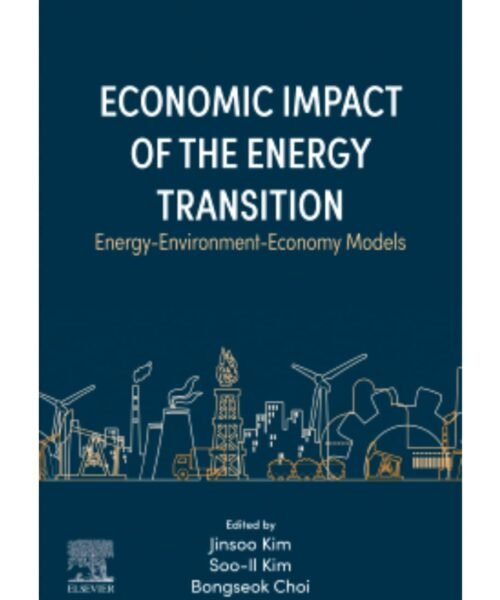ASSESSING ABIA STATE’S READINESS FOR ELECTRIC CAR MANUFACTURING: OPPORTUNITIES AND CHALLENGES.
Abia State stands at the precipice of an industrial transformation, strategically positioning itself to become Nigeria’s epicenter for electric vehicle (EV) manufacturing. This ambition transcends political rhetoric, manifesting in concrete infrastructure projects, strategic partnerships, and policy reforms that collectively form a compelling value proposition for investors. Leveraging underreported competitive advantages, Abia demonstrates a multi-faceted approach to overcoming Nigeria’s broader energy and logistical challenges, creating a unique environment for sustainable automotive production.
FOUNDATIONAL INFRASTRUCTURE: ENERGY AND DIGITAL BACKBONE.
The State’s energy strategy is its most significant competitive edge Geometric Power provides dedicated electricity to nine local government areas (LGAs), including the industrial hub of Aba, creating a ring – fenced grid independent of Nigeria’s unreliable national network. Governor Alex Otti’s administration is finalizing negotiations to acquire the remaining Abia segment of the Enugu Electricity Distribution Company (EEDC), aiming to integrate the remaining eight LGAs under the Umuahia and Abia North ringed-fence into the stable power corridor.
The State in collaboration with the Federal Government are working round the clock to prioritize gas supply from NNPC to Geometric Power and resolve the lingering transmission bottlenecks at the Alaoji Power Plant. For EV manufacturing, which demands massive, consistent energy, this localized grid is revolutionary. ROXETTES Motors, an auto assembling plant operating at Ukwa West in Abia State explicitly cited this energy reliability as a primary reason for locating its 40,000-unit annual capacity plant in Obu-Aku City, where natural gas lines will power CNG generators, further reducing grid dependence.
PARALLEL INVESTMENTS IN DIGITAL INFRASTRUCTURE UNDERPIN ADVANCED MANUFACTURING PROCESSES:
The State is deploying a Statewide fiber-optic backbone, beginning with a secure government intranet connecting ministries in Umuahia. This high-speed data transmission network supports real-time monitoring, supply chain automation, and edge computing applications critical for precision manufacturing . Governor Otti directly links this digital transformation to industrial competitiveness, emphasizing that “only the technologically-ready shall thrive in the New Abia”.
STRATEGIC PARTNERSHIPS AND MANUFACTURING ECOSYSTEMS:
Abia is cultivating a comprehensive EV ecosystem through public-private partnerships. The multi-million alliance with COSCHARIS Group, a conglomerate with five decades of automotive experience, focusing on deploying EVs for intra-state transport in Aba, Umuahia, and Ohafia. This isn’t merely a vehicle procurement deal; it encompasses charging infrastructure deployment and ecosystem development, with COSCHARIS lauding Abia’s approach as “trailblazing”. Simultaneously, the indigenous automobile firm, ROXETTES Motors is constructing an assembly plant in Obu-Aku City (Ukwa West LGA), previously scheduled for operational launch by October 2024.

The facility is designed and structured to produce 28,000 EVs annually (70% of its 40,000-unit capacity), alongside CNG conversion kits, leveraging adjacent gas pipelines. The plant represents $50+ Million investment and will employ over 1,000 Abians directly . Governor Otti is further incentivizing localization, offering to increase the State’s equity stake in the project beyond the initial 2% land valuation and constructing a dual carriageway to connect the plant to the Port Harcourt – Enugu Expressway.
POLICY FRAMEWORKS AND INVESTMENT INCENTIVES:
The State’s 2024 Business Environment Reforms Action Plan (BERAP) created a streamlined regulatory landscape. It automated tax breaks for qualifying investors and reduced land acquisition timelines dramatically, as evidenced by ROXETTES Motors receiving an offer letter and Certificate of Occupancy for its assembly plant site in under one month.
Governor Otti’s administration is targeting ₦120 billion in internally generated revenue (IGR) through real-time data systems, enhancing fiscal predictability for long-term industrial investors. This policy certainty contrasts sharply with the policy ambiguities of the Federal Government, such as unclear customs waivers for EV components identified as a national bottleneck .
WORKFORCE DEVELOPMENT AND LOCAL CONTENT DEVELOPMENT:
Governor Otti Recognises that advanced manufacturing demands specialized skills. Under his transformational leadership, Abia State is implementing mandatory digital literacy programs for its civil service, creating a talent pipeline for tech-intensive industries. Initiatives like Abia TechRise target youth in ICT training, ensuring a reservoir of technicians for assembly plants and supply chains operations.
Governor Otti emphasizes backward integration, urging ROXETTES Motors to “replicate some of those [components] in Aba,” leveraging the city’s famed artisan culture to produce brake pads, rubber fittings, and basic electronics. The “show them what to do” philosophy acknowledges incremental progress toward full manufacturing self-sufficiency.
PERSISTENT CHALLENGES AND STRATEGIC MITIGATIONS DESPITE IMPRESSIVE FOUNDATIONS:
Abia State push towards EV manufacturing presents significant hurdles. They are;
- National EV Adoption Barriers: Nigeria’s overall EV penetration remains low (estimated 5,000 units nationwide, including 2-3 wheelers), hampered by high costs (pre-owned EVs start at ₦30 million), sparsely charging infrastructure, and financing difficulties. Michael Agbor of EV World Africa noted Nigerians’ reluctance toward auto loans compounds affordability issues .
- Energy Transition Realities: While Abia’s grid is a superior charging logistics for widespread consumer, EV use require further investment. ROXETTES’ CNG generators mitigates immediate factory needs, but public charging stations are scarce .
- Battery Ecosystem Gaps: Nigeria lacks local battery manufacturing or recycling capacity. Sourcing batteries remains import – dependent and costly, unlike Indonesia, which leverages its nickel reserves (22% of global reserves) to attract $1 billion+ battery gigafactories .
- Investor’s Perceptions: Overcoming historical skepticism about Southeast Nigeria’s security and infrastructure requires sustained success demonstration. BERAP’s phased fee structures aim to ease initial entry costs, while visible projects like MTN’s cloud infrastructure deployment serve as credible anchors .
A PHASED PATHWAY TO INDUSTRIALIZATION:
Abia’s roadmap reflects pragmatic sequencing;
- 2025-2026:Complete Statewide fiber-optic backbone and universal broadband access; finalize EEDC grid acquisition; scale up solar deployments .
- 2027-2028: ROXETTES Motors and COSCHARIS facilities achieve full operational capacity; local component manufacturing pilots launch in Aba .
- 2029-2030: Secure partnerships with global battery/cell manufacturers; develop recycling facilities; target 30% local content in assembled EVs .
- 2031: Achieve integrated EV manufacturing ecosystem with closed-loop material flows and export capacity .
CONCLUSION: The Viability of an Automotive Hub in Abia State demonstrates unparalleled subnational readiness for EV manufacturing in Nigeria. Its integrated strategy entails the prioritisation of energy autonomy through Geometric Power, democratizing connectivity via digital infrastructure, and de-risking investments through BERAP to creates a compelling foundation. While national challenges like consumer adoption and battery supply chains require longer – term solutions, Abia’s focus on industrial-scale production for regional export markets (leveraging AfCFTA) must mitigates initial domestic market limitations.
Governor Otti’s vision of moving “from assembling to manufacturing” and creating a “new civil service community that responds to dynamic realities” captures the transformative intent. With disciplined execution, Abia is positioned not merely to host assembly plants, but to catalyze Southeast Nigeria’s emergence as West Africa’s automotive corridor, fundamentally reshaping the region’s industrial geography. The journey has decisively begun.
Dr Chukwuemeka Ifegwu Eke.







